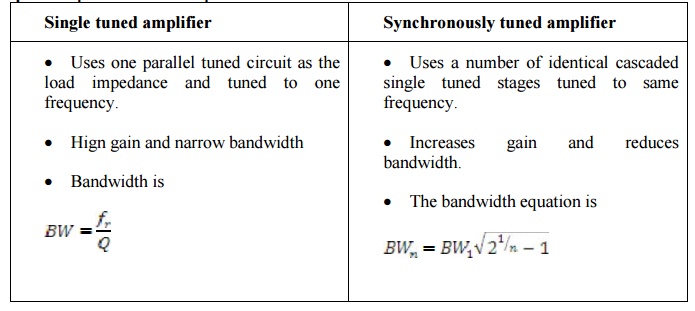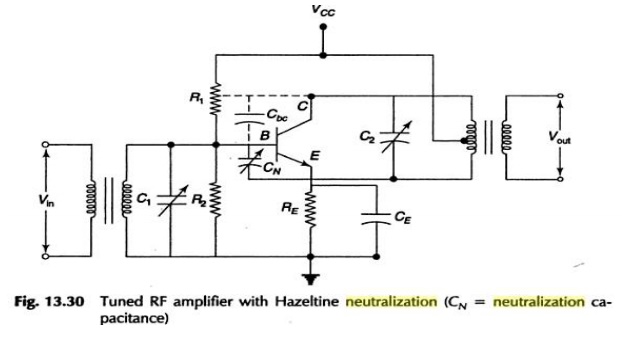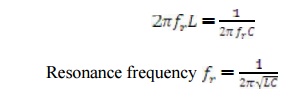Chapter: Electronic Circuits : Tuned Amplifiers
Important Short Questions and Answers: Tuned Amplifiers
TUNED AMPLIFIERS
1. What is tuned amplifier? What are the
various types of tuned amplifiers?
A tuned amplifier amplifies a certain range of
frequencies (narrow band of frequencies) in the radio frequency region and
rejects all other frequencies.
Types:
The various types of tuned amplifiers are
i)
Single
tuned amplifier
ii)
Double
tuned amplifier
iii)
Stagger
tuned amplifier & synchronously tuned amplifier.
2. Define tuned amplifier.
A tuned amplifier is defined as an amplifier
circuit which amplifies a certain range of frequencies (narrow band of
frequencies) in the radio frequency region and reject all other frequencies.
3. Why tuned amplifier cannot be used at low
frequency?
For low frequencies the size L and C are large.
So the circuit will be bulky and expensive, hence the tuned amplifiers cannot
be used at low frequency.
4. What is the other name for tuned amplifier?
Tuned amplifiers used for amplifying narrow
band of frequencies hence it si also known as “narrow band amplifier” or “Band
pass amplifier”.
5. Mention The Two Applications of tuned
amplifiers.
i)
They are
used in IF amplifiers in Radio and TV receivers.
ii)
They are
used in wireless communication systems.
6. State
two advantages and two disadvantages of tuned amplifiers. Advantages:
i)
They
amplify defined frequencies
ii)
Signal
to noise ratio (SNR) at output is good.
iii)
They are
suited for radio transmitters and receivers.
Disadvantages:
i)
They are
not suitable to amplify audio frequencies.
ii)
Circuit
is bulky and costly.
iii)
The
design is complex.
7.
What is Single tuned and double tuned
amplifier?
Single tuned amplifier:
A amplifier circuit that uses a single parallel tuned circuit as a load is
called single tuned amplifier.
Double tuned amplifier:
The amplifiers having two parallel resonant
circuit in its load are called double tuned amplifiers.
8.
What are the advantages of double tuned
amplifier over single tuned amplifier?
i)
Provides
higher gain
ii)
Provides
large 3dB bandwidth.
iii)
Possess
flatter response having steeper sides.
9. What are the different coil losses?
i)
Hysteresis
loss
ii)
Copper
loss
iii)
Eddy
current loss
10. What
are the differences between single tuned and synchronously tuned amplifiers?

11. What
is Stagger tuned amplifier
If two or more tuned circuits which are
cascaded are tuned to slightly different resonant frequencies, it is possible
to obtain an increased bandwidth with a flat passbandwith steep sides. This
technique is known as stagger tuning and the amplifier using this technique is
called as stagger tuned amplifier.
12. What
are the different types of neutralization?
i)
Hazeltine
neutralization
ii)
Neutrodyne
neutralization
iii)
Rice
neutralization
13. Why
neutralization required in tuned amplifiers? & Draw the circuit for Narrow
Band neutralization.
In order to prevent oscillations in tuned RF
amplifiers it was necessary to reduce the stage gain to a level that ensured
circuit stability. This can be accomplished in several ways such as lowering
the Q of the tuned circuits, stagger tuning ,loose coupling between the stages.
Instead of losingthe circuit performance to achieve stability, a circuitin
which the troublesome effect of the collector to base capacitance of the
transistor was neutralised by introducing a signal which cancels the signal
coupled through the collector to base capacitance.

14.
Define loaded and unloaded Q.
Unloaded Q:
It is defined as the ratio of stored energy to
dissipated energy in a reactor or resonator. For an inductor or capacitor

Where X= reactance:
Rs= series resistance
Loaded Q:
The loaded Q or QL of a resonator is
determined by how tightly the resonator is coupled to its terminations.

15. What
is the effect of cascading n stages of identical single tuned amplifiers
(synchronously tuned) on the overall 3db bandwidth?
The bandwidth of n stage cascaded single tuned
amplifier is given as

From the above equation it is clear that the
overall 3dB bandwidth reduces.
16.
Mention the bandwidth of a double tuned amplifier

Q is the Quality factor of the coil alone
b- is a constant
17.
Where is the Q-point placed in a class C type amplifier? What are its
applications?
In a class C type amplifier the Q-point is
placed below the X-axis.
Applications:
·
The
Class C amplifiers are used to amplify the signals at radio frequencies.
·
They are
also used in mixer circuits.
18.
Brief the relation between bandwidth and Q-factor.
The quality factor determines the 3dB bandwidth
for the resonant circuit. The 3dB bandwidth for resonant circuit is given by
BW=fr/Q
Where fr= centre frequency of a resonator
BW= f2-f1
19.
What is narrow band neutralization?
The process of cancelling the instability
effect due to the collector to base capacitance of the transistor in tuned
circuits by introducing a signal which cancels the signal coupled through the
collector to base capacitance is called narrow band neutralization.
20.
Mention two important features of stagger tuned
amplifier.
i)
It has
better flat, wide band characteristics.
ii)
Increased
bandwidth
21. What
is the need for neutralization circuits?
In tuned RF amplifiers, the inter-junction
capacitance Cbc of the transistor becomes dominant (i.e) its
reactance is low, it provides the feedback signal from collector to base. If
some feedback signal manages to reach the input from output in a positive
manner with proper phase shift, then amplifier keeps oscillating, thus
stability of amplifier gets affected. Hence neutralization is employed.
22. Draw
a class C tuned amplifier circuit and what is its efficiency.

23.
Derive the resonance frequency for the tank circuit shown:
At resonance XL=XC

24.
A tuned circuit has resonant frequency of 1600
KHz and bandwidth of 10 KHz. What is the value of its Q-factor?
25.
A tuned amplifier has its maximum gain at a
frequency of 2 MHz and has a bandwidth of 50 KHz.calculate the Q-factor.
26.
An inductor of 250µH has Q=300 at 1MHz.
Determine R s and Rp of the inductor.
27.
A parallel resonant circuit has an inductance
of 150µH and a capacitance of 100pF. Find the resonant frequency.
Related Topics